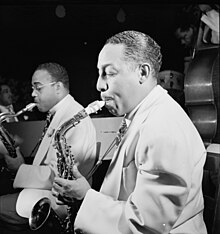
Summary
Albert Omega Sears (February 21, 1910 – March 23, 1990)[1] was an American jazz tenor saxophonist and bandleader, sometimes credited as Big Al Sears.
Al Sears | |
|---|---|
 Al Sears (left) with Johnny Hodges, 1946 | |
| Background information | |
| Birth name | Albert Omega Sears |
| Born | February 21, 1910 Macomb, Illinois, U.S. |
| Died | March 23, 1990 (aged 80) St. Albans, New York City, U.S. |
| Genres | Jazz |
| Occupation(s) | Musician |
| Instrument(s) | Saxophone |
Sears was born in Macomb, Illinois, United States.[2] His first major gig came in 1928 when he replaced Johnny Hodges in Chick Webb's ensemble.[2] Following this he played with Elmer Snowden (1931–32), then led his own groups between 1933 and 1941.[2] In the early 1940s he was with Andy Kirk (1941–42) and Lionel Hampton (1943-44) before he became a member of Duke Ellington's Orchestra in 1944, replacing Ben Webster.[2] He remained with Ellington until 1949,[2] when first Jimmy Forrest and then Paul Gonsalves took over his chair. He played with Johnny Hodges in 1951–52 and recorded the tune "Castle Rock" with him;[2] the tune became a hit but was released under Hodges's name.
Sears was in Alan Freed's band when Freed did live shows, being introduced as "Big Al Sears."[2] He played as a studio musician on R&B albums in the 1950s and recorded two albums for Swingville in 1960. He also owned several record labels, including Arock, Serock, and Gator.[1]
In 1990, he died in St. Albans, New York, at the age of 80.[1]
Discography edit
As leader edit
- Grade A Dance Music with a Swing Beat (Audio Lab, 1960)
- Swing's the Thing (Prestige, 1960)
- Rockin' in Rhythm with Taft Jordan and Hilton Jefferson as the Swingville All-Stars (Prestige, 1960)
- Things Ain't What They Used to Be (Swingville, 1961)
As sideman edit
- Mildred Anderson, No More in Life (Prestige, 1961)
- Aretha Franklin, Aretha (Columbia, 1961)
- Al Hibbler, After the Lights Go Down Low (Atlantic 1957)
- Johnny Hodges, Castle Rock (Norgran, 1955)
- Johnny Hodges, In a Tender Mood (Norgan, 1955)
- Budd Johnson, Blues a la Mode (Felsted, 1958)
- Jimmy Witherspoon, Goin' to Kansas City Blues (RCA Victor, 1958)
References edit
- ^ a b c Eagle, Bob; LeBlanc, Eric S. (2013). Blues – A Regional Experience. Santa Barbara: Praeger Publishers. p. 135. ISBN 978-0313344237.
- ^ a b c d e f g Colin Larkin, ed. (1992). The Guinness Encyclopedia of Popular Music (First ed.). Guinness Publishing. p. 2215. ISBN 0-85112-939-0.
Other sources edit
- Scott Yanow, Al Sears at Allmusic
- Scott DeVeaux and Barry Kernfeld. "Sears, Al." The New Grove Dictionary of Jazz, 2nd ed. Oxford University Press.
External links edit
- About Al Sears


